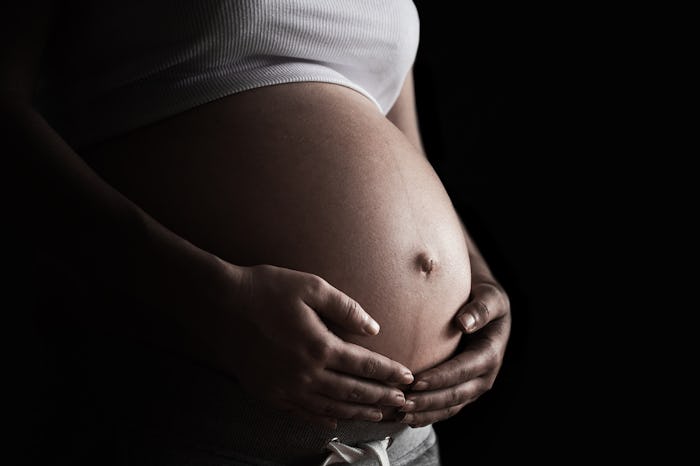Life

Here's What Happens To Your Belly Button During Pregnancy
Your body will change a lot during your pregnancy. At first you might not see any huge physical differences, but then the transformation can come at you fast — from your expanding waistline to your swelling ankles and to your protruding belly button. Speaking of which, exactly what happens to your belly button during pregnancy? Is there anything you should watch out for? Fortunately, most changes to your belly button will be harmless, but there are a few things you should pay attention to.
During your first trimester, you probably won't notice many changes to your belly button. But once you hit the second and third trimester, your button may "pop" from an innie to an outie. This happens when your growing uterus nudges your belly button outward, according to What To Expect, and many pregnant women will experience this phenomenon. It can be an amusing change, too, as my toddler daughter can attest — she has loved poking my bulging stomach during my second pregnancy.
Generally speaking, a popped belly button won't cause any pain, but some women find that their belly button becomes very sensitive during pregnancy, which may lead to skin irritation. If that's the case for you, Parenting magazine suggested placing a Band-Aid over the affected area or wearing looser tops to prevent the fabric from rubbing against your stomach.
If you have an existing belly piercing, you might be wondering if you should take out your jewelry. The good news? As long as your piercing is healed and feels comfortable, there's no need to remove your piercing, as concluded by the American Pregnancy Association. But if you're considering getting your belly button pierced while you're expecting, it's recommended that you wait until after delivery, because a belly piercing may be more susceptible to infection as your pregnant stomach expands.
While changes to your pregnant belly button are typically harmless, Parents magazine noted that sometimes a woman's button will protrude so far that it causes an umbilical hernia. (Ouch.) Your doctor should be able to treat this condition at a routine office visit, but in some instances, minor surgery might be needed.
During your pregnancy, your body will change in many ways, physically and emotionally and mentally, too. Out of all of these shifts, however, the changes to your belly button should be one of the least of your worries. But if you find yourself fretting about your newfound outie, remember that you'll soon get your regular belly button back after you've delivered.